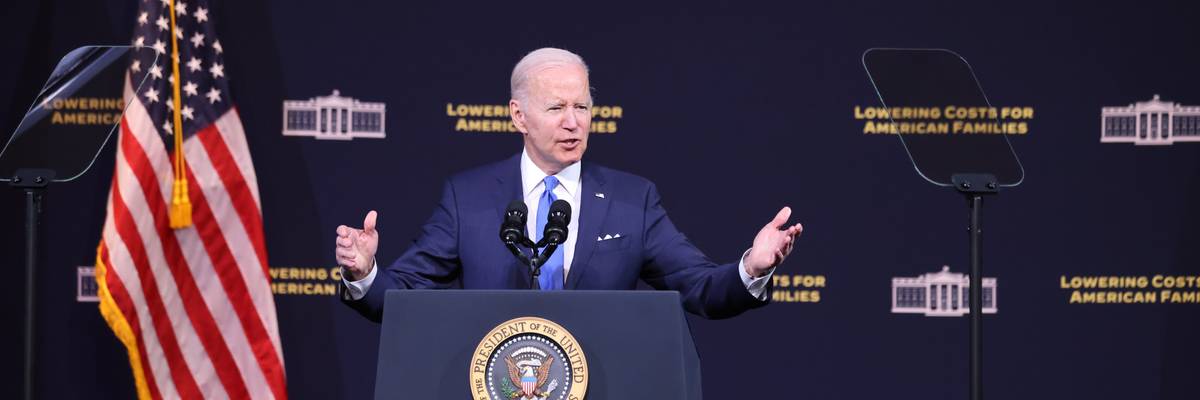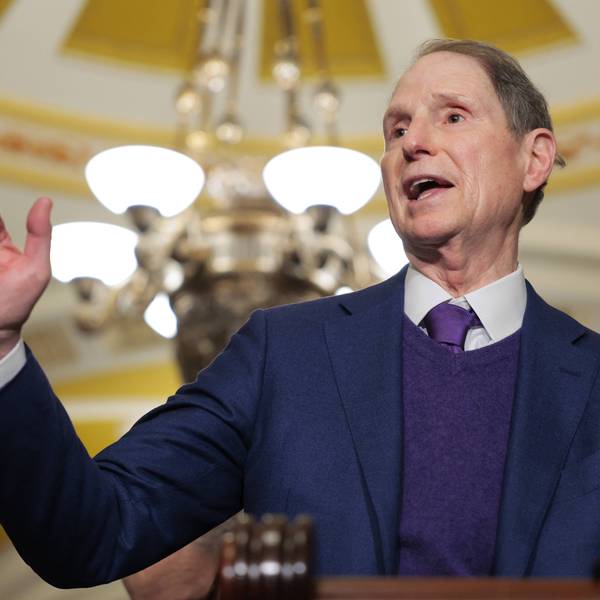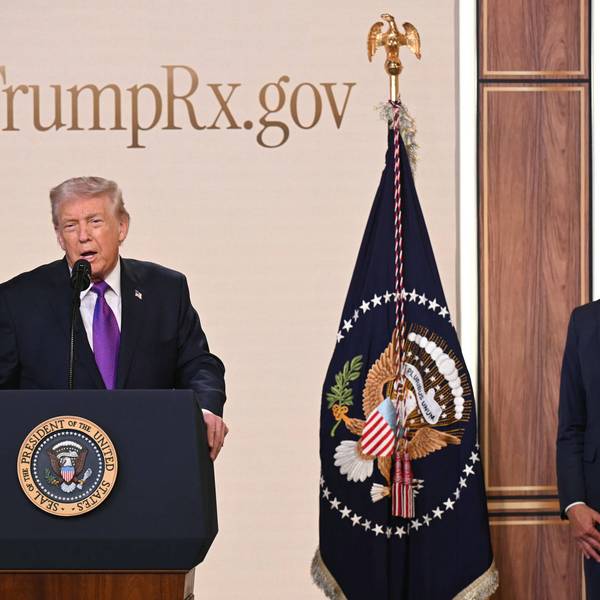
President Joe Biden speaks about the high cost of prescription drugs and child care at Green River College on April 22, 2022 in Auburn, Washington.
'Watershed Moment': Biden Admin Unveils First 10 Drugs Subject to Medicare Price Negotiations
"Drug corporations pretend this is a catastrophe, but I would rather see that money in seniors' pockets than Big Pharma's," said one advocate.
The Biden administration on Tuesday unveiled a list of the first 10 prescription drugs that will be subject to direct price negotiations with Medicare, a key step toward curbing the pharmaceutical industry's ability to drive up the costs of lifesaving medications at will.
The list, released by the Centers for Medicare and Medicaid Services (CMS), comes as major players in the pharmaceutical industry are waging an aggressive legal fight against Medicare price negotiations, which are required under the Inflation Reduction Act (IRA). Half a dozen pharmaceutical companies and two industry coalitions have filed a total of eight lawsuits against the Biden administration in recent weeks.
Included on the newly released list is Eliquis, a medication used to prevent and treat blood clots. The manufacturer of the drug, which carries a list price of $561 for a 30-day supply (or more than $6,700 per year), is Bristol-Myers Squibb, one of the companies suing the Biden administration to prevent direct price negotiations.
David Mitchell, a cancer patient and founder of Patients for Affordable Drugs Now, said in a statement that he is among the millions of people across the U.S. who take Eliquis. "In Canada, where there is a generic," he noted, "the price is less than $1,700 [per year]."
"With negotiations, millions of patients will finally get a more affordable price for drugs like Eliquis," Mitchell added.
The list also includes Johnson & Johnson's Xarelto, AbbVie's Imbruvica, Merck's Januvia, and AstraZeneca's Farxiga.
Combined, the 10 drugs cost Medicare tens of billions of dollars a year.
"When implemented, prices on negotiated drugs will decrease for up to 9 million seniors," President Joe Biden said in a statement. "These seniors currently pay up to $6,497 in out-of-pocket costs per year for these prescriptions. In addition, the nonpartisan Congressional Budget Office reports that this will save taxpayers $160 billion by reducing how much Medicare pays for drugs through negotiation and inflation rebates."
Peter Maybarduk, director of the Access to Medicines program at Public Citizen, hailed the list's publication as "a watershed moment for medicine affordability."
"Drug corporations pretend this is a catastrophe, but I would rather see that money in seniors' pockets than Big Pharma's," he added. "Drug corporations, in crude arrogance, are suing to limit price negotiations under the IRA. But the list shows instead how important it is to expand those negotiation powers."
Unless the pharmaceutical industry succeeds in its legal effort to stop negotiations—or Republicans take power and repeal the IRA provisions—prices agreed upon by CMS and drug manufacturers will take effect in 2026. CMS and the manufacturers of the initial 10 drugs must sign an agreement to negotiate maximum fair prices for the medications by October 1, 2023.
As KFF explains, "The number of drugs subject to price negotiation will increase in future years: 15 Medicare Part D drugs for 2027, another 15 drugs covered under Medicare Part D or Part B for 2028, and another 20 drugs covered under Part D or Part B drugs for 2029 and later years."
"IRA should be expanded and consistently improved, toward supporting affordable medicine for all, rather than limited or delayed to mollify pharma monopolists."
While progressives pushed for more expansive price negotiations as the IRA was developed, the narrower provisions that were ultimately adopted could still have major impacts on U.S. drug prices given that a small number of medications account for a significant percentage of Medicare Part D spending.
Americans pay far higher prices for prescription drugs than people in other countries, and millions in the U.S. are forced to ration their medications because they can't afford the prescribed dosage.
Allowing Medicare to negotiate the prices of prescription drugs directly with pharmaceutical companies is overwhelmingly popular. According to a West Health-Gallup poll released Monday, "83% of Americans favor price negotiations between Medicare and pharmaceutical companies, including 95% of Democrats, 76% of Independents and 75% of Republicans."
"Big Pharma's high drug prices are killing us, fueling a public health and humanitarian crisis of its own," said Tim Lash, the president of West Health. "Giving Medicare the power to negotiate is an important step, but we can't lose sight of the fact that more reforms are needed."
Maybarduk of Public Citizen echoed that message, noting that "several monopolized drugs that are expensive for Medicare today are exempted from price negotiation, and will remain expensive." The IRA includes several carveouts, including exemptions for so-called "small biotech" drugs as well as medications that have been approved by the Food and Drug Administration for less than nine years.
"During those years, drugmakers will exploit patent monopolies with minimal checks on profiteering. That profiteering period is even longer for biologics, which comprise some of the most exorbitantly priced drugs," Maybarduk said. "IRA should be expanded and consistently improved, toward supporting affordable medicine for all, rather than limited or delayed to mollify pharma monopolists. The Biden administration has our support as it resists unjust lawsuits and implements the strongest possible IRA."
This story has been corrected to clarify that Eliquis costs $561 for a 30-day supply.
An Urgent Message From Our Co-Founder
Dear Common Dreams reader, The U.S. is on a fast track to authoritarianism like nothing I've ever seen. Meanwhile, corporate news outlets are utterly capitulating to Trump, twisting their coverage to avoid drawing his ire while lining up to stuff cash in his pockets. That's why I believe that Common Dreams is doing the best and most consequential reporting that we've ever done. Our small but mighty team is a progressive reporting powerhouse, covering the news every day that the corporate media never will. Our mission has always been simple: To inform. To inspire. And to ignite change for the common good. Now here's the key piece that I want all our readers to understand: None of this would be possible without your financial support. That's not just some fundraising cliche. It's the absolute and literal truth. We don't accept corporate advertising and never will. We don't have a paywall because we don't think people should be blocked from critical news based on their ability to pay. Everything we do is funded by the donations of readers like you. Will you donate now to help power the nonprofit, independent reporting of Common Dreams? Thank you for being a vital member of our community. Together, we can keep independent journalism alive when it’s needed most. - Craig Brown, Co-founder |
The Biden administration on Tuesday unveiled a list of the first 10 prescription drugs that will be subject to direct price negotiations with Medicare, a key step toward curbing the pharmaceutical industry's ability to drive up the costs of lifesaving medications at will.
The list, released by the Centers for Medicare and Medicaid Services (CMS), comes as major players in the pharmaceutical industry are waging an aggressive legal fight against Medicare price negotiations, which are required under the Inflation Reduction Act (IRA). Half a dozen pharmaceutical companies and two industry coalitions have filed a total of eight lawsuits against the Biden administration in recent weeks.
Included on the newly released list is Eliquis, a medication used to prevent and treat blood clots. The manufacturer of the drug, which carries a list price of $561 for a 30-day supply (or more than $6,700 per year), is Bristol-Myers Squibb, one of the companies suing the Biden administration to prevent direct price negotiations.
David Mitchell, a cancer patient and founder of Patients for Affordable Drugs Now, said in a statement that he is among the millions of people across the U.S. who take Eliquis. "In Canada, where there is a generic," he noted, "the price is less than $1,700 [per year]."
"With negotiations, millions of patients will finally get a more affordable price for drugs like Eliquis," Mitchell added.
The list also includes Johnson & Johnson's Xarelto, AbbVie's Imbruvica, Merck's Januvia, and AstraZeneca's Farxiga.
Combined, the 10 drugs cost Medicare tens of billions of dollars a year.
"When implemented, prices on negotiated drugs will decrease for up to 9 million seniors," President Joe Biden said in a statement. "These seniors currently pay up to $6,497 in out-of-pocket costs per year for these prescriptions. In addition, the nonpartisan Congressional Budget Office reports that this will save taxpayers $160 billion by reducing how much Medicare pays for drugs through negotiation and inflation rebates."
Peter Maybarduk, director of the Access to Medicines program at Public Citizen, hailed the list's publication as "a watershed moment for medicine affordability."
"Drug corporations pretend this is a catastrophe, but I would rather see that money in seniors' pockets than Big Pharma's," he added. "Drug corporations, in crude arrogance, are suing to limit price negotiations under the IRA. But the list shows instead how important it is to expand those negotiation powers."
Unless the pharmaceutical industry succeeds in its legal effort to stop negotiations—or Republicans take power and repeal the IRA provisions—prices agreed upon by CMS and drug manufacturers will take effect in 2026. CMS and the manufacturers of the initial 10 drugs must sign an agreement to negotiate maximum fair prices for the medications by October 1, 2023.
As KFF explains, "The number of drugs subject to price negotiation will increase in future years: 15 Medicare Part D drugs for 2027, another 15 drugs covered under Medicare Part D or Part B for 2028, and another 20 drugs covered under Part D or Part B drugs for 2029 and later years."
"IRA should be expanded and consistently improved, toward supporting affordable medicine for all, rather than limited or delayed to mollify pharma monopolists."
While progressives pushed for more expansive price negotiations as the IRA was developed, the narrower provisions that were ultimately adopted could still have major impacts on U.S. drug prices given that a small number of medications account for a significant percentage of Medicare Part D spending.
Americans pay far higher prices for prescription drugs than people in other countries, and millions in the U.S. are forced to ration their medications because they can't afford the prescribed dosage.
Allowing Medicare to negotiate the prices of prescription drugs directly with pharmaceutical companies is overwhelmingly popular. According to a West Health-Gallup poll released Monday, "83% of Americans favor price negotiations between Medicare and pharmaceutical companies, including 95% of Democrats, 76% of Independents and 75% of Republicans."
"Big Pharma's high drug prices are killing us, fueling a public health and humanitarian crisis of its own," said Tim Lash, the president of West Health. "Giving Medicare the power to negotiate is an important step, but we can't lose sight of the fact that more reforms are needed."
Maybarduk of Public Citizen echoed that message, noting that "several monopolized drugs that are expensive for Medicare today are exempted from price negotiation, and will remain expensive." The IRA includes several carveouts, including exemptions for so-called "small biotech" drugs as well as medications that have been approved by the Food and Drug Administration for less than nine years.
"During those years, drugmakers will exploit patent monopolies with minimal checks on profiteering. That profiteering period is even longer for biologics, which comprise some of the most exorbitantly priced drugs," Maybarduk said. "IRA should be expanded and consistently improved, toward supporting affordable medicine for all, rather than limited or delayed to mollify pharma monopolists. The Biden administration has our support as it resists unjust lawsuits and implements the strongest possible IRA."
This story has been corrected to clarify that Eliquis costs $561 for a 30-day supply.
The Biden administration on Tuesday unveiled a list of the first 10 prescription drugs that will be subject to direct price negotiations with Medicare, a key step toward curbing the pharmaceutical industry's ability to drive up the costs of lifesaving medications at will.
The list, released by the Centers for Medicare and Medicaid Services (CMS), comes as major players in the pharmaceutical industry are waging an aggressive legal fight against Medicare price negotiations, which are required under the Inflation Reduction Act (IRA). Half a dozen pharmaceutical companies and two industry coalitions have filed a total of eight lawsuits against the Biden administration in recent weeks.
Included on the newly released list is Eliquis, a medication used to prevent and treat blood clots. The manufacturer of the drug, which carries a list price of $561 for a 30-day supply (or more than $6,700 per year), is Bristol-Myers Squibb, one of the companies suing the Biden administration to prevent direct price negotiations.
David Mitchell, a cancer patient and founder of Patients for Affordable Drugs Now, said in a statement that he is among the millions of people across the U.S. who take Eliquis. "In Canada, where there is a generic," he noted, "the price is less than $1,700 [per year]."
"With negotiations, millions of patients will finally get a more affordable price for drugs like Eliquis," Mitchell added.
The list also includes Johnson & Johnson's Xarelto, AbbVie's Imbruvica, Merck's Januvia, and AstraZeneca's Farxiga.
Combined, the 10 drugs cost Medicare tens of billions of dollars a year.
"When implemented, prices on negotiated drugs will decrease for up to 9 million seniors," President Joe Biden said in a statement. "These seniors currently pay up to $6,497 in out-of-pocket costs per year for these prescriptions. In addition, the nonpartisan Congressional Budget Office reports that this will save taxpayers $160 billion by reducing how much Medicare pays for drugs through negotiation and inflation rebates."
Peter Maybarduk, director of the Access to Medicines program at Public Citizen, hailed the list's publication as "a watershed moment for medicine affordability."
"Drug corporations pretend this is a catastrophe, but I would rather see that money in seniors' pockets than Big Pharma's," he added. "Drug corporations, in crude arrogance, are suing to limit price negotiations under the IRA. But the list shows instead how important it is to expand those negotiation powers."
Unless the pharmaceutical industry succeeds in its legal effort to stop negotiations—or Republicans take power and repeal the IRA provisions—prices agreed upon by CMS and drug manufacturers will take effect in 2026. CMS and the manufacturers of the initial 10 drugs must sign an agreement to negotiate maximum fair prices for the medications by October 1, 2023.
As KFF explains, "The number of drugs subject to price negotiation will increase in future years: 15 Medicare Part D drugs for 2027, another 15 drugs covered under Medicare Part D or Part B for 2028, and another 20 drugs covered under Part D or Part B drugs for 2029 and later years."
"IRA should be expanded and consistently improved, toward supporting affordable medicine for all, rather than limited or delayed to mollify pharma monopolists."
While progressives pushed for more expansive price negotiations as the IRA was developed, the narrower provisions that were ultimately adopted could still have major impacts on U.S. drug prices given that a small number of medications account for a significant percentage of Medicare Part D spending.
Americans pay far higher prices for prescription drugs than people in other countries, and millions in the U.S. are forced to ration their medications because they can't afford the prescribed dosage.
Allowing Medicare to negotiate the prices of prescription drugs directly with pharmaceutical companies is overwhelmingly popular. According to a West Health-Gallup poll released Monday, "83% of Americans favor price negotiations between Medicare and pharmaceutical companies, including 95% of Democrats, 76% of Independents and 75% of Republicans."
"Big Pharma's high drug prices are killing us, fueling a public health and humanitarian crisis of its own," said Tim Lash, the president of West Health. "Giving Medicare the power to negotiate is an important step, but we can't lose sight of the fact that more reforms are needed."
Maybarduk of Public Citizen echoed that message, noting that "several monopolized drugs that are expensive for Medicare today are exempted from price negotiation, and will remain expensive." The IRA includes several carveouts, including exemptions for so-called "small biotech" drugs as well as medications that have been approved by the Food and Drug Administration for less than nine years.
"During those years, drugmakers will exploit patent monopolies with minimal checks on profiteering. That profiteering period is even longer for biologics, which comprise some of the most exorbitantly priced drugs," Maybarduk said. "IRA should be expanded and consistently improved, toward supporting affordable medicine for all, rather than limited or delayed to mollify pharma monopolists. The Biden administration has our support as it resists unjust lawsuits and implements the strongest possible IRA."
This story has been corrected to clarify that Eliquis costs $561 for a 30-day supply.

